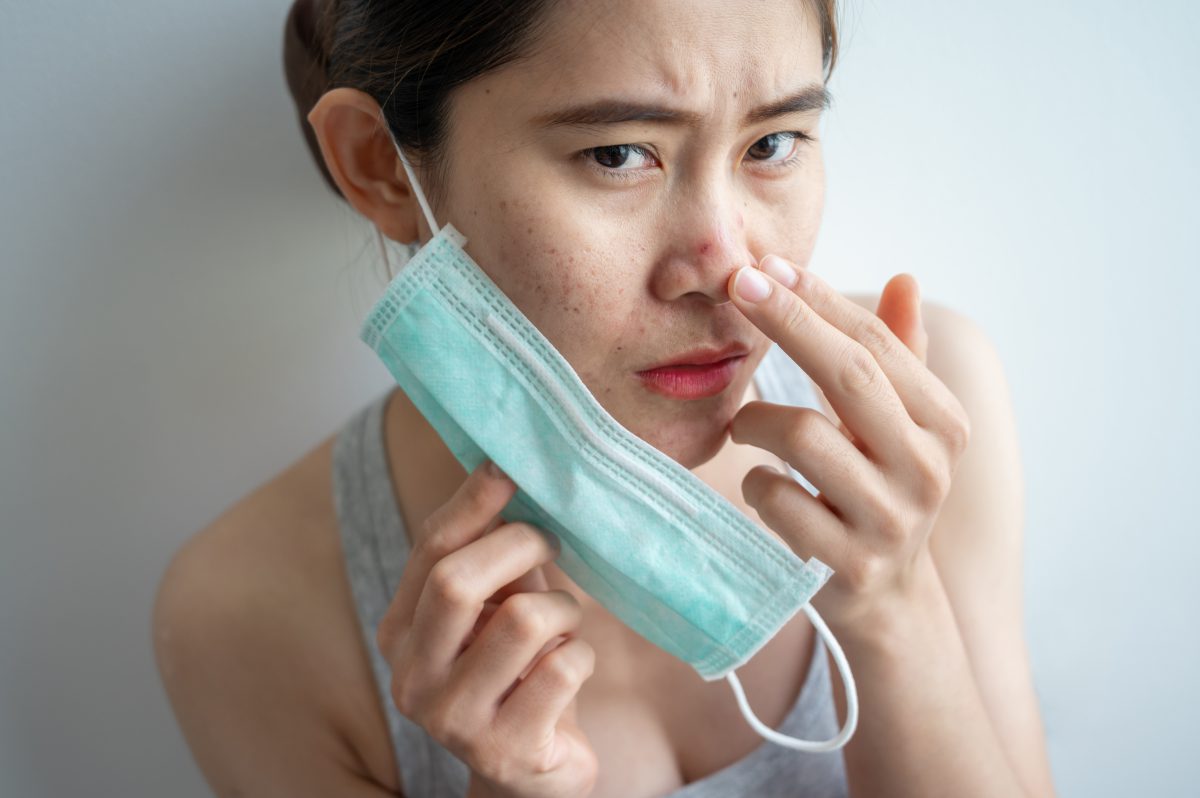Home » Acne News » 6 steps to managing mask-related breakouts
6 steps to managing mask-related breakouts

Maskne is the colloquial term used to describe acne breakouts associated with wearing face masks. Dr Philip Tong, a dermatologist and the Deputy Director of Research at The Skin Hospital in Sydney, shares his advice on what it is and what to do about it.
What causes maskne?
Maskne is caused primarily by friction, heat and sweat – and it’s a condition not only associated with face masks, Dr Tong says.
“This friction-related condition – known as acne mechanica – is common. We also see it in people who wear caps a lot,” he said.
Maskne occurs when friction from the face mask, plus heat and sweat from your skin, disrupt the delicate balance of the skin’s microbiome.
We all have millions of bacteria, fungi and viruses that protect our skin. Once the balance of the skin’s microbiome is altered in some way, breakouts are more likely to happen.
Maskne usually appears as acne around the mouth and on the chin and, if you’ve been wearing a face mask for extended periods, the cause can seem pretty obvious.
But Dr Tong says there may be other underlying causes, too. If you suddenly have a rash, pimples or any breakouts on the face, see a doctor to make sure it’s properly diagnosed.
“It’s important to see a healthcare professional if you’re concerned, because not every skin outbreak, even when you’re wearing a mask, is due to maskne.
“It can be due to other skin conditions, like periorificial dermatitis or rosacea, so it’s always wise to have any unusual skin outbreak reviewed and checked”.
How to manage or avoid maskne
Here are Dr Tong’s tips for managing or avoiding maskne:
1. Use gentle skin care products
Avoid harsh cleansers or scrubs, and use gentle cleansers and moisturisers. That’s important to help your skin maintain its healthy microbiome.
Only use special treatments after consulting with your healthcare professional. For example, while benzoyl peroxide or alpha hydroxy acid retinoids may help to treat acne, they can also cause irritation. This is why it’s best to only use them under medical advice, Dr Tong says.
2. Keep makeup to a minimum
Try to go makeup-free (one advantage of wearing a mask is no one will know!) or keep your makeup to a minimum.
“Wearing less makeup will reduce some of the factors that cause maskne,” Dr Tong says.
3. Use cotton or silk masks
A mask with an inner layer of cotton or silk can be more breathable and gentle on the skin, and cause less friction.
“Silk masks have become popular, but they may not be as breathable as cotton masks,” Dr Tong says.“It’s about finding a mask that works for you and your skin type.”
It’s also important to follow the health advice in your state about the type of mask that’s recommended for maximum Covid-19 protection.
4. Wash masks regularly
If you’re wearing reusable masks, use a clean mask every day rather than wearing the same mask several days in a row, Dr Tong says.
Also, wash your masks regularly and ensure the washing process removes any residual makeup (if you wear it).
5. Change disposable masks often
It’s important to use them as they’re intended – by disposing of them after each single use, and specifically after a few hours of wear, Dr Tong says.
“Change them often, because if you wear them for extended periods of time, some of the fabric starts to degrade and that’s when the irritation occurs.
“Once the mask is wet through perspiration, it also loses its function as a mask, and will no longer protect you.”
6. Have mask-free time where possible
We all need to wear face masks at certain times (depending on Covid rules in your area), but when you’re at home or in the car by yourself, take the opportunity to have as much mask-free time as possible.
“If it’s safe to do so (based on your local requirements), have mask-free periods at work as well, to allow your skin to have a break from the mask and re-acclimatise,” Dr Tong says.
Check with your doctor for advice
If you’re still experiencing persistent maskne despite trying these tips above, then seek the advice of a healthcare professional.
Acne can affect your mood and get you down, but rest assured there are plenty of effective treatments available. If you’ve got new or ongoing acne, a dermatologist can discuss with you the best treatment options.
Read More
How acne can impact your mental health
How to deal with pimple breakouts as a teenager
